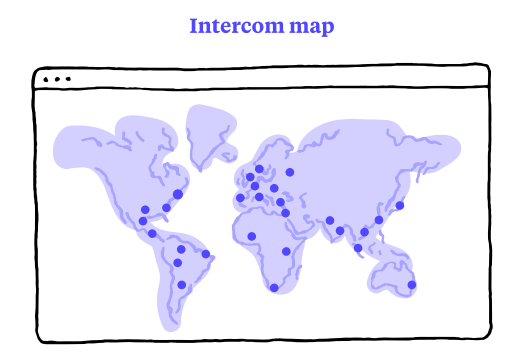Terrifying customer questions.
And why you should ask them.
Photo by Tahiro Achoub on Unsplash
If you’re selling, chances are you’re talking to prospective customers all the time. If you’re responsible for customer services, chances are you too are talking to customers all the time. But the problem is, those conversations are framed around a particular outcome: buying from you or asking you to help them with a challenge they are having. How many of us actually talk to customers about our product ideas before we actually create them? In my experience, surprisingly few.
This is not a criticism. I think everyone has probably been guilty of it at one time or another. I certainly was several times. We built products that were only shown to prospective customers when they were ready, or almost ready, to buy. As a result, we had quite a few misses among our hits. Even our most successful product, ScreenCloud, was beyond MVP by the time we started talking to prospective customers. It just so happened that what we had was pretty close to Product Market Fit, but more by luck than judgement.
If you’re at the stage where you have the kernel of an idea: either a brand new product or a major new feature to an existing product and you’ve done your basic research, how do you know whether it’s hitting the right note when it comes to the people you want to sell it to unless you talk to them?
Why don’t we talk to prospective customers about our prospective ideas?
I think it comes down to three things: fear of rejection (we all have that); a fear of not having something tangible to them; and a fear of blowing our one big opportunity to sell. But these things are misguided.
Nothing to show
The idea that you can’t talk to prospective customers about your new idea if you don’t have something to show them assumes that the conversation you ideally need to have is all about your new product idea. But I would argue that that is the last thing that you want to be talking to them about.
The conversation you really want to have is whether what you’re planning is something they would need, and if you’re slightly off-target with what you’re proposing. You don’t do that by talking about your new product idea, you do that by asking them about their world: their daily work, the challenges they face and the impact that has on their ability to do their job.
Let’s say you your idea is about creating tools for non-AI experts to build AI-driven apps (this was the hypothetical I used last week, so I figured why not resurrect it this week, too). What you really need to do is figure out whether your prospective customers would ever need a product like that and how they might use it.
The conversation absolutely doesn’t have to include you demoing the product. Why would you demo something that solves a problem you don’t even know they have? It would be like bringing along wedding venue ideas on a first date.
[Fun fact: the first time I met my (now) wife, we spent a good deal of time perusing a wedding accessories brochure together]
Ask questions that terrify you
I mentioned fear of rejection. However, if you’re not actually showing them your idea, there’s nothing to reject. That doesn’t mean it should be an easy ride. What you have to do is ask questions that terrify you.
By that I mean, think of questions where the potential answer could kill your idea dead in its tracks. That the potential answer would be the very last thing you’d want them to say. There’s no value in you skirting around the topic and trying to see if your idea might be something they would be interested in, you have to directly ask them if the problem you think you are solving is one they actually have.
In my ‘AI tools for non-AI experts’ example, it would be something like “have you built any AI-driven apps?” If the answer is no, “have you thought about building any AI-driven apps?”. If the answer is still no, then you might start to see that this person isn’t a customer. That’s not to say that there are no potential customers in the world for what you’re imagining, it’s just that for this person, you may as well move on.
If they’ve thought about building AI-driven apps, what’s stopped them from doing so? If they say, yes we’ve thought about it and the thing stopping us is that we don’t have the skills in-house and we don’t want to outsource, then you’ll know you’re on the right tracks. All of that without actually demoing your MVP!
‘But I already know my product is going to be wanted’
You might think, ‘I don’t need to ask those questions because it’s kind of obvious that they will want this product’. Maybe there’s already something out there doing the same thing and you’re building something better. Or maybe you can see that they’re using one of your features already and all you want to do is make it better. But why not ask the questions anyway?
Intercom launched a feature that was a map that showed their users where their customers were.
As you can see, it’s pretty basic. But it became popular really quickly. They immediately thought, ‘hey people love the map feature, we need to make it better’. They could have considered adding more functionality… maybe a zoomable map that showed data for each ‘dot’. Maybe stats by city, by country. Maybe filters so you could see different slices of your data on the map. Maybe country borders or regional areas or clustering.
But when they spoke to their customers, they realised that all of those ideas would be solving a problem that didn’t exist. The ‘problem’ their map solved was allowing their customers to show off that they had customers around the world. They used it at trade shows and exhibitions, they used it on social media and they used it to show their investors.
It meant for Intercom, that if they wanted to make a better map, they just had to make it look nicer, make it hide data automatically and make it easy to share. In fact, including more ‘map’ functionality might have made it a worse product because it was less impactful for the story their customers were trying to tell.
Not asking the obvious questions is crazy.
Fear of blowing your big opportunity to sell
The idea here is you get this chance to speak to someone who you would give your right arm to get as a customer. This is your one big chance to make an impression. To quote Eminem, “You only get one shot , do not miss your chance to blow. This opportunity comes once in a lifetime”.
But the reality is that you’re not stood on a stage in front of a baying audience waiting for you to choke. You don’t have one shot. Think instead that you’re potentially creating a relationship that is going to last beyond the 30 mins you have to make an impression. Isn’t it better to have a genuine conversation about the challenges that person/company has, show some understanding, show some insights, show some empathy - than to insist on trying to flog them a half-baked product idea that they haven’t even expressed an interest in yet?
Here’s a thing: people like to give their opinions on something if they feel it might benefit them and if the recipient of their opinion is respectful of their input. If you’ve ever read about the Ben Franklin Effect you’ll know that asking someone to do something for you (when received with gratitude) is more likely to result in them thinking positively about you. Something to do with the idea that if you’ve done someone a favor, you must fundamentally like them - because why would you do something for someone you disapprove of?
I have direct recent experience of this. I asked the CEO of a company if he would spare 20 mins for me to ask him some questions as he was an expert in his field and I was lacking some insights. He agreed, spoke about himself largely for over 30 minutes and then he followed up afterwards saying he ‘greatly enjoyed our conversation’. A few weeks later I bumped into him and he seemed genuinely pleased to see me. I’m pretty sure if I wanted to arrange another call with him, he’d say yes.
My point is: if done well, you will get both great insights and a potential customer when you’re ready to sell. Or at least someone who will give you the time of day.
Photo by Guillermo Velarde on Unsplash
In almost every case, the answer is ‘speak to your customers’
I come back to my first point. We resist speaking to potential customers about our ideas because they might turn around and tell you that it’s terrible. Snuffing it out before it’s even had a chance to evolve. But if you set yourself the task of understanding the problem (or the Job) first, then you’ll be much more prepared by the time you show your hand.
Too often we create something and nervously put it out there, crossing our fingers and hoping for a great response. Like rolling a dice and hoping that fortune smiles down upon us. But the crazy thing is, we don’t need to rely on superstition and luck when it comes to new ideas. The answers are already out there and they’re easy to get.
Got a great idea for a new product?
Had a Eureka moment about a new product feature?
Looking to create a whole new marketing campaign?
Don’t ask me. Don’t ask your investors. Don’t ask your business partners. And don’t just guess. Ask your customers. They are the only ones who can really tell you whether you’re onto something or not.


